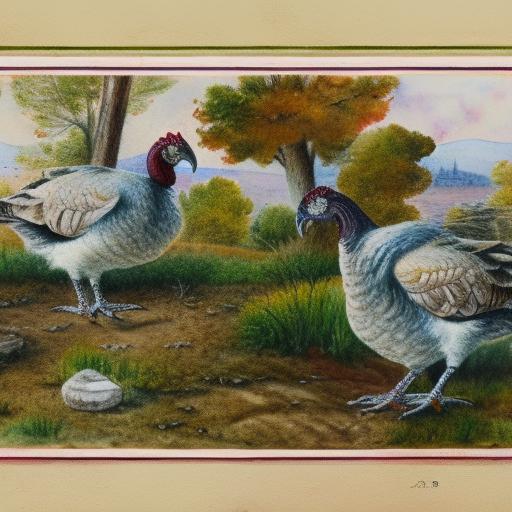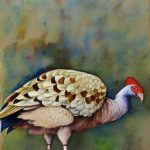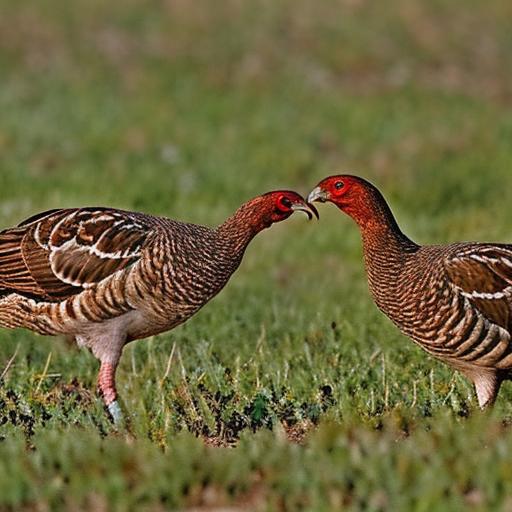Turkey breeding is an important aspect of the poultry industry, as turkeys are a popular source of meat for many people around the world. Breeding turkeys involves the careful selection and management of breeding stock to ensure the production of healthy and high-quality birds. The process of turkey breeding requires an understanding of the reproductive cycle of turkeys, as well as the factors that can affect their breeding activity. It is also important to recognize the signs of declining breeding activity in turkeys and to implement management strategies to address these issues. As the demand for turkey meat continues to grow, it is essential for poultry producers to have a thorough understanding of turkey breeding in order to maintain a successful and sustainable operation.
Key Takeaways
- Turkey breeding involves the controlled mating and reproduction of turkeys for the purpose of producing offspring for meat or egg production.
- The reproductive cycle of turkeys includes mating, egg laying, and incubation, and is influenced by factors such as nutrition, lighting, and environmental conditions.
- Factors affecting turkey breeding include age, genetics, nutrition, lighting, and environmental stressors, which can impact fertility and reproductive success.
- Turkeys may stop breeding due to age, health issues, or environmental stressors, leading to a decline in reproductive activity.
- Signs of declining breeding activity in turkeys include decreased egg production, poor egg quality, and reduced mating behavior, which may require management strategies for aging turkey breeding stock.
Reproductive Cycle of Turkeys
The reproductive cycle of turkeys is influenced by various factors, including age, nutrition, and environmental conditions. Female turkeys, known as hens, typically reach sexual maturity at around 7-8 months of age, while male turkeys, known as toms, reach sexual maturity at around 8-10 months of age. During the breeding season, which typically occurs in the spring and early summer, hens will begin to lay eggs. The laying of eggs is triggered by the increasing daylight hours and can continue for several weeks. Toms will then begin to display mating behavior, such as puffing up their feathers and making vocalizations, in an effort to attract hens for mating. Once mating occurs, the hens will continue to lay eggs, which can be collected for incubation or left for natural brooding. It is important for poultry producers to carefully monitor the reproductive cycle of their turkeys and provide appropriate care and management to ensure successful breeding and healthy offspring.
The reproductive cycle of turkeys can be influenced by various factors, including nutrition and environmental conditions. Proper nutrition is essential for maintaining the reproductive health of turkeys, as deficiencies in key nutrients such as protein, vitamins, and minerals can negatively impact egg production and fertility. Additionally, environmental conditions such as temperature and lighting can also affect the reproductive cycle of turkeys. Extreme temperatures can cause stress and reduce breeding activity, while inadequate lighting can disrupt the natural hormonal balance of the birds. It is important for poultry producers to provide a comfortable and well-managed environment for their breeding turkeys in order to optimize their reproductive performance. By understanding the reproductive cycle of turkeys and the factors that can influence it, poultry producers can implement effective management strategies to support successful breeding and ensure the long-term sustainability of their operation.
Factors Affecting Turkey Breeding
There are several factors that can affect turkey breeding, including age, genetics, nutrition, and environmental conditions. As turkeys age, their reproductive performance may decline, leading to reduced egg production and fertility. It is important for poultry producers to carefully manage the breeding stock and consider replacing older birds with younger, more reproductively active individuals. Genetics also play a significant role in turkey breeding, as certain breeds may have different reproductive capabilities and traits. Selecting high-quality breeding stock with desirable genetic traits can help improve the overall reproductive performance of a turkey flock.
Nutrition is another critical factor that can impact turkey breeding. A well-balanced diet that meets the specific nutritional requirements of breeding turkeys is essential for maintaining optimal reproductive health. Deficiencies in key nutrients such as protein, vitamins, and minerals can lead to reduced egg production and fertility. Additionally, environmental conditions such as temperature, lighting, and housing can also influence turkey breeding activity. Providing a comfortable and well-managed environment for breeding turkeys is essential for supporting their reproductive performance.
When Turkeys Stop Breeding
Turkeys may stop breeding for a variety of reasons, including age, stress, health issues, and environmental factors. As turkeys age, their reproductive performance may decline, leading to reduced egg production and fertility. It is important for poultry producers to monitor the breeding activity of their turkeys and consider replacing older birds with younger individuals to maintain optimal reproductive performance within the flock. Additionally, stress can have a significant impact on turkey breeding activity. Factors such as overcrowding, poor ventilation, and inadequate nutrition can cause stress and reduce the overall reproductive health of the birds.
Health issues can also contribute to a decline in turkey breeding activity. Common health problems such as respiratory infections, parasites, and metabolic disorders can negatively impact egg production and fertility. It is important for poultry producers to implement effective disease prevention and control measures to maintain the overall health of their breeding stock. Environmental factors such as extreme temperatures, inadequate lighting, and poor housing conditions can also disrupt turkey breeding activity. By addressing these various factors that can cause turkeys to stop breeding, poultry producers can implement management strategies to support optimal reproductive performance within their flock.
Signs of Declining Breeding Activity in Turkeys
There are several signs that indicate declining breeding activity in turkeys, including reduced egg production, poor fertility, and changes in mating behavior. A decrease in egg production is often one of the first indicators of declining breeding activity in turkeys. Hens may lay fewer eggs or stop laying altogether, which can significantly impact the overall reproductive performance of the flock. Poor fertility is another common sign of declining breeding activity in turkeys. Eggs may have lower hatch rates or fail to hatch at all, indicating potential issues with mating behavior or reproductive health.
Changes in mating behavior can also signal declining breeding activity in turkeys. Toms may exhibit less interest in mating or display reduced vocalizations and courtship behaviors. Additionally, hens may show less receptivity to mating attempts or avoid nesting altogether. By closely monitoring these signs of declining breeding activity in turkeys, poultry producers can take proactive measures to address any underlying issues and support the overall reproductive health of their flock.
Management Strategies for Aging Turkey Breeding Stock

As turkey breeding stock ages, it is important for poultry producers to implement effective management strategies to support their reproductive performance. One approach is to carefully monitor the breeding activity of older birds and consider replacing them with younger individuals to maintain optimal reproductive performance within the flock. Selecting high-quality replacement stock with desirable genetic traits can help improve the overall reproductive capabilities of the turkey flock.
Proper nutrition is essential for supporting the reproductive health of aging turkey breeding stock. Providing a well-balanced diet that meets the specific nutritional requirements of breeding turkeys can help maintain optimal egg production and fertility. Additionally, ensuring a comfortable and well-managed environment for aging turkey breeding stock is essential for supporting their reproductive performance. This includes providing adequate housing, ventilation, and lighting to minimize stress and promote overall reproductive health.
Regular health monitoring and disease prevention are also important aspects of managing aging turkey breeding stock. Implementing effective disease prevention and control measures can help maintain the overall health of the birds and minimize potential issues that could impact their reproductive performance. By implementing these management strategies for aging turkey breeding stock, poultry producers can support optimal reproductive performance within their flock and ensure the long-term sustainability of their operation.
Conclusion and Future Considerations for Turkey Breeding
In conclusion, turkey breeding is an important aspect of the poultry industry that requires careful management and consideration of various factors that can impact reproductive performance. Understanding the reproductive cycle of turkeys, as well as the factors that can affect their breeding activity, is essential for maintaining a successful and sustainable operation. By closely monitoring signs of declining breeding activity in turkeys and implementing effective management strategies for aging breeding stock, poultry producers can support optimal reproductive performance within their flock.
Looking ahead, future considerations for turkey breeding may include continued research into genetic selection for improved reproductive traits, as well as advancements in nutrition and environmental management practices to support optimal reproductive health. Additionally, ongoing efforts to monitor and address potential health issues that could impact turkey breeding activity will be important for maintaining the overall productivity and sustainability of turkey production operations. By staying informed about current best practices and emerging technologies in turkey breeding, poultry producers can continue to improve their management strategies and support successful turkey reproduction for years to come.
If you’re interested in learning more about poultry breeding, you might also want to check out this informative article on chicken coop nest boxes. Understanding the importance of providing suitable nesting spaces for your chickens can greatly impact their breeding habits and overall well-being.
FAQs
What is the breeding season for turkeys?
The breeding season for turkeys typically occurs in the spring, with mating and nesting activities peaking in April and May.
At what age do turkeys start breeding?
Turkeys generally reach sexual maturity at around 7 to 8 months of age, at which point they are capable of breeding.
When do turkeys stop breeding?
Turkeys typically stop breeding in the late spring or early summer, as the breeding season winds down and nesting activities come to an end.
What factors can affect turkey breeding behavior?
Factors such as daylight length, temperature, and food availability can influence turkey breeding behavior. Additionally, stress, disease, and predator presence can also impact breeding activities.
Meet Walter, the feathered-friend fanatic of Florida! Nestled in the sunshine state, Walter struts through life with his feathered companions, clucking his way to happiness. With a coop that’s fancier than a five-star hotel, he’s the Don Juan of the chicken world. When he’s not teaching his hens to do the cha-cha, you’ll find him in a heated debate with his prized rooster, Sir Clucks-a-Lot. Walter’s poultry passion is no yolk; he’s the sunny-side-up guy you never knew you needed in your flock of friends!







